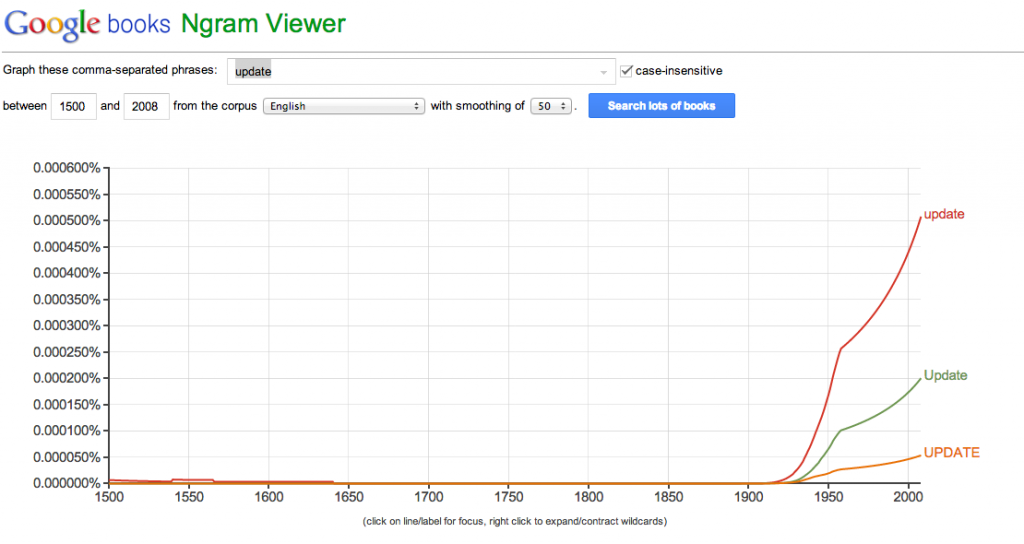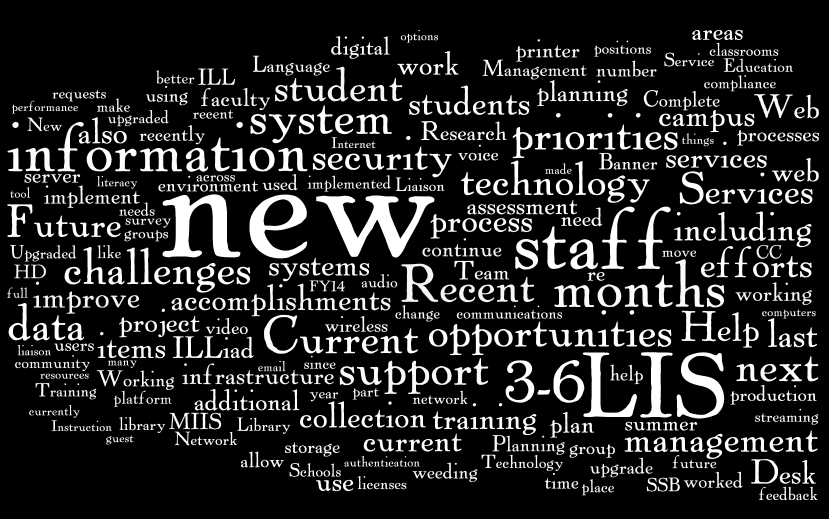
We’ve posted the March 2014 Update from LIS.
As has become our custom, we write this update three times a year to provide ourselves and rest of the community with a review of recent accomplishments, and more importantly, a roadmap for what to expect in the next three to six months. In addition, we make a nod to what we see as future issues and challenges further down the road.
Highlights since the last LIS Update include:
-
We continued to co-sponsor with CTLR the Academic Roundtable to encourage cross-campus conversation on important topics having to do with pedagogy, scholarly inquiry, and student learning.
-
We also continued our planning for the digital liberal arts initiative.
-
We continued to build out new library subject guides
-
In Special Collections, we supported students and faculty during Winter Term including A People’s History of Middlebury and Field House Museum, Adventure Writing, Space and Place in the Graphic Novel, and Matt Longman’s seminar on higher education.
-
We started to archive Ward Prize-winning student essay in our online archive
-
We made more progress in building out our new videoconferencing infrastructure and upgraded a number of classroom.
-
We continued to encourage our community to use Web Help Desk to request service from us.
-
We created a new guide to training options that include both on-line, off-site, and on campus options.
Key goals for the next three to six months include:
-
As part of the broader faculty governance conversations taking place on campus, we in turn are thinking about a wide range of governance questions. How do we ensure appropriate consultation with our students, faculty, and staff to ensure that our planning and prioritization is aligned with the needs of the community that we serve?
-
We are hiring! We are currently running searches for a director of academic technology, a senior systems administrator, a head of collections, a media services specialist, and a network security analyst.
-
We are discussing the technical and policy implications of converting our google apps from a pilot to a full-supported production system.
-
We will also be discussing the process for evaluating new options for our email/calendaring system, and updating our analysis of the privacy and security implications of moving certain services to the cloud.
-
We are busy planning for the move of the CSNS and Security work groups to Exchange Street, the move of the Enterprise Applications area to Painter House, and the re-use of space within the Davis Family Library to support the digital liberal arts initiative.
-
We are planning an upgrade to the latest version of Microsoft Exchange.
-
We’ll be rolling out a Network Access Control system that will allow us to more carefully control which devices can join our network.
-
We’ll be reconfiguring the wireless network to make it simpler and more secure. As part of that, we’ll be putting in place a guest registration system to allow for those who only need to use it on a temporary basis.
-
We will be working closely with many offices across campus to develop a multi-year plan for Nolij, the document imaging system that allows for offices to automate many of their paper-based processes.
-
We’ll be upgrading Drupal, the software that powers our website to the latest version.
-
We’re also working with the Office of Communications on rolling out a new design for the homepage and some of the key pages that are linked to from the home page.
-
We will have an external security review of our systems as part of a consortial effort to improve our security stance.
-
We will continue our efforts to study trends in the ways our public computer labs are used to help us plan for the future of providing computing resources to our students.
-
We will start a pilot project where you can check out a bicycle from the circulation desk.
-
We’re writing a Request for Proposal as part of our investigation into a new campus phone system.
While we pursue all of this, we will of course keep doing all of our regular stuff: prepping for Language Schools, upgrading classroom and lab technology, adding more wireless access points, updating various systems, teaching information literacy courses, buying and cataloging library materials, and distributing new computers.
One goal that we are very keen to pursue is to invent a fool-proof, indestructible stapler that no one can steal.
If you have questions, comments, or suggestions on any of this, please feel free to contact me (Mike Roy, mdroy@middlebury.edu) or do so on-line at https://sites.middlebury.edu/lis/2014/03/27/march-lis-update/ .
— mike




You must be logged in to post a comment.